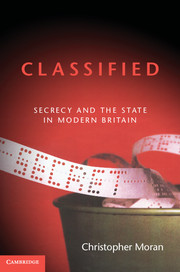Book contents
- Frontmatter
- Contents
- Illustrations
- Foreword
- Acknowledgements
- Abbreviations
- Introduction
- Part I 1889–1945
- Part II Secrecy and the press
- Part III Secrecy and political memoirs
- Part IV Intelligence secrets, spy memoirs and official histories
- 7 Keeping the secrets of wartime deception: Ultra and Double-Cross
- 8 SOE in France
- 9 Counterblast: official history of British intelligence in the Second World War
- Epilogue: from Wright to WikiLeaks
- Notes
- Bibliography
- Index
- Plate section
Epilogue: from Wright to WikiLeaks
Published online by Cambridge University Press: 05 April 2013
- Frontmatter
- Contents
- Illustrations
- Foreword
- Acknowledgements
- Abbreviations
- Introduction
- Part I 1889–1945
- Part II Secrecy and the press
- Part III Secrecy and political memoirs
- Part IV Intelligence secrets, spy memoirs and official histories
- 7 Keeping the secrets of wartime deception: Ultra and Double-Cross
- 8 SOE in France
- 9 Counterblast: official history of British intelligence in the Second World War
- Epilogue: from Wright to WikiLeaks
- Notes
- Bibliography
- Index
- Plate section
Summary
Being more open is a risk that has to be taken in the 21st century, if the support and understanding of the public are to be obtained.
Retired MI5 Director General Stella Rimington, 2002In today's open society, no government institution is given the benefit of the doubt all the time.
SIS Chief Sir John Sawers, 28 October 2010Ostensibly, the past twenty years or so has seen a retreat from secrecy on a scale that would have been unthinkable to many of the personalities studied in this book. In 1989, the centenary of Britain's inaugural secrecy legislation, the Official Secrets Act was amended at long last, repealing and replacing the catch-all Section 2, and providing greater specificity on what categories of information fell within the purview of criminal law. On 1 January 2005, Britain finally joined a number of other democratic countries in bringing into effect a Freedom of Information Act, codifying a right of access to information held by most public authorities. Thirty years before, mandarins had run Machiavellian rings around their ministerial masters to prevent anything even remotely resembling a legally inscribed public right to know. The new Act turned on its head the natural order that had prevailed for centuries in Britain; namely, the preconception that information belonged to the state rather than to the citizen. Now, information was public property and the state had to justify withholding it. As a line of defence against government non-compliance, an Information Commissioner, wholly independent of Whitehall, was given powers to serve an enforcement notice and levy fines if he was satisfied that requests were being unjustly blocked or processed tardily.
- Type
- Chapter
- Information
- ClassifiedSecrecy and the State in Modern Britain, pp. 329 - 349Publisher: Cambridge University PressPrint publication year: 2012

